Luke Skywalker
Super Moderator
{vb:raw ozzmodz_postquote}:
Nurses carry the body of an Ebola victim from a house outside Monrovia, Liberia, on Wednesday, August 6. Health officials say the current Ebola outbreak in West Africa is the deadliest ever. The World Health Organization reports that the Ebola outbreak in Liberia, Sierra Leone, Guinea and Nigeria has infected more than 1,700 people and killed more than 900 this year.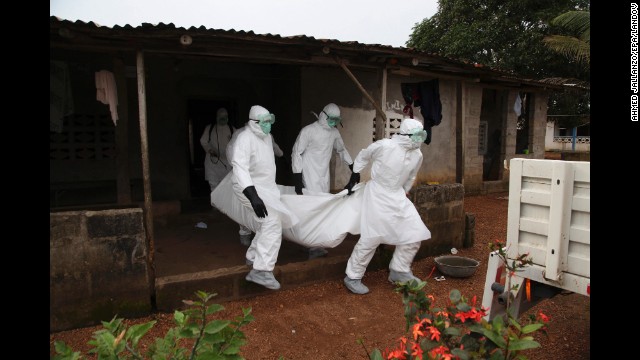
A Nigerian health official wears protective gear August 6 at the Murtala Muhammed International Airport in Lagos, Nigeria.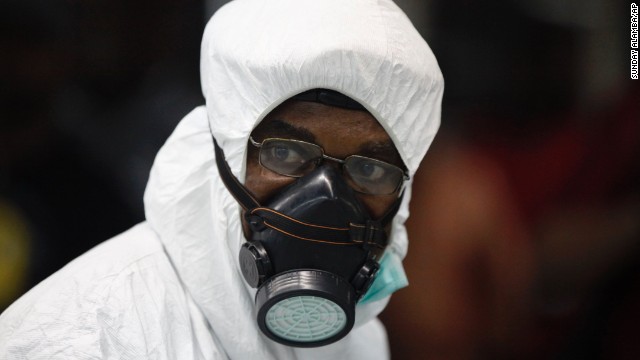
Officials with the Centers for Disease Control and Prevention in Atlanta sit in on a conference call about Ebola with CDC team members deployed in West Africa on Tuesday, August 5.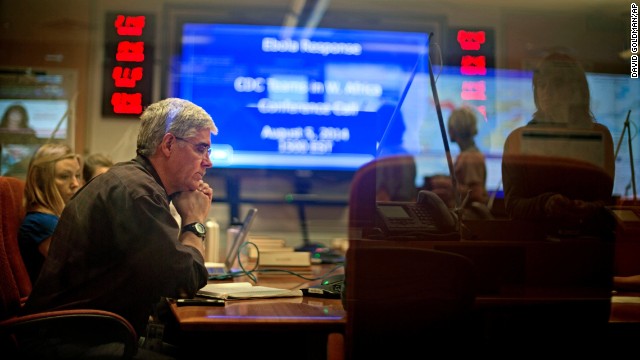
Aid worker Nancy Writebol, wearing a protective suit, gets wheeled on a gurney into Emory University Hospital in Atlanta on August 5. A medical plane flew Writebol from Liberia to the United States after she and her colleague, Dr. Kent Brantly, were infected with the Ebola virus in the West African country. Health officials say the current Ebola outbreak in West Africa is the deadliest ever.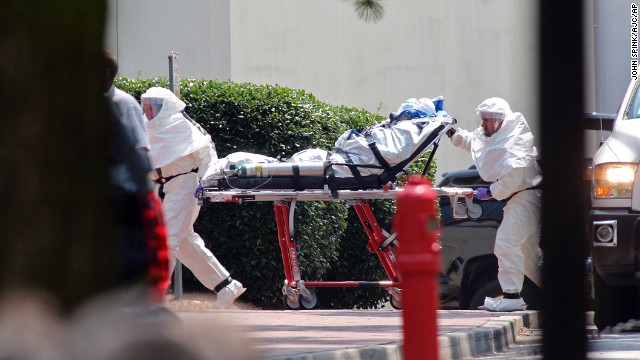
Nigerian health officials are on hand to screen passengers at Murtala Muhammed International Airport on Monday, August 4.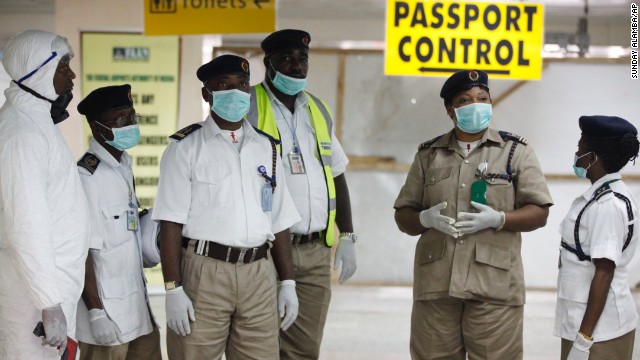
A man gets sprayed with disinfectant Sunday, August 3, in Monrovia.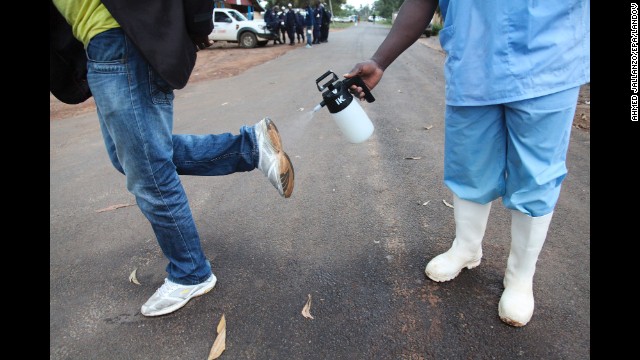
Dr. Kent Brantly, right, gets out of an ambulance after arriving at Emory University Hospital in Atlanta on Saturday, August 2. Brantly was infected with the Ebola virus in Africa, but he was brought back to the United States for further treatment.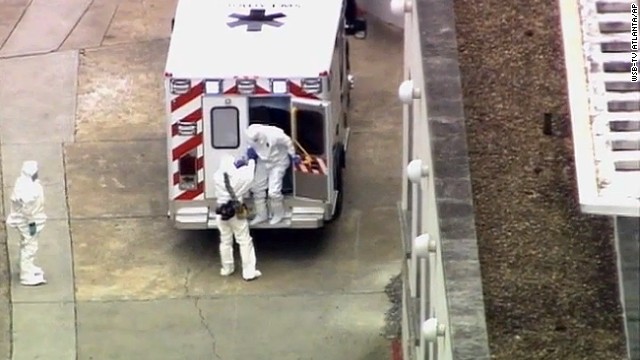
Nurses wearing protective clothing are sprayed with disinfectant Friday, August 1, in Monrovia after they prepared the bodies of Ebola victims for burial.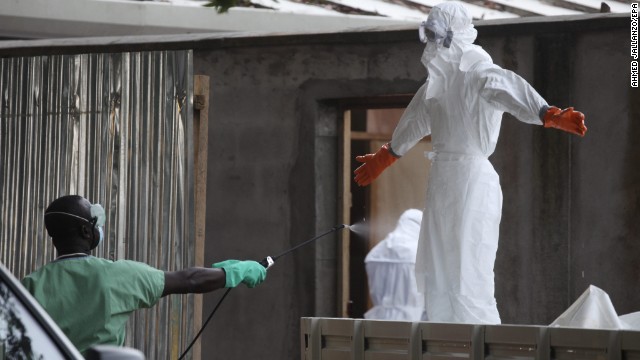
A nurse disinfects the waiting area at the ELWA Hospital in Monrovia on Monday, July 28.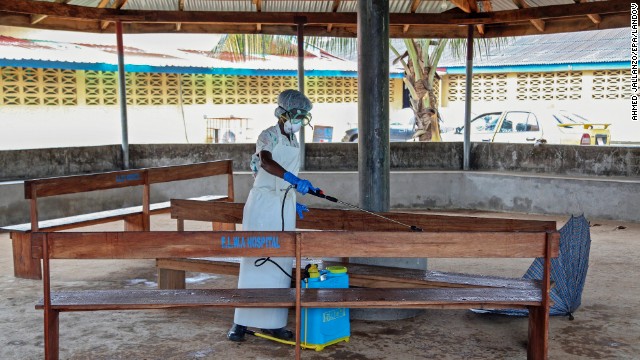
Liberian President Ellen Johnson Sirleaf, right, walks past an Ebola awareness poster in downtown Monrovia as Liberia marked the 167th anniversary of its independence Saturday, July 26. The Liberian government dedicated the anniversary to fighting the deadly disease.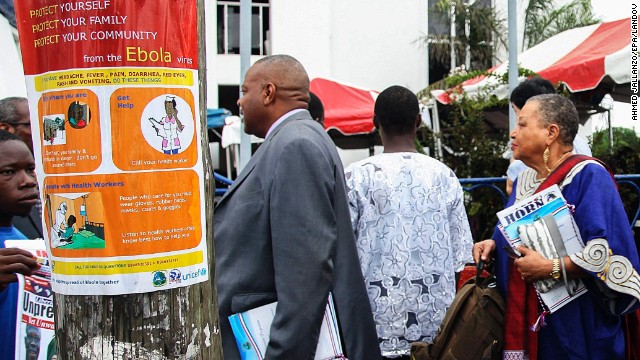
In this photo provided by Samaritan's Purse, Dr. Kent Brantly, left, treats an Ebola patient in Monrovia. On July 26, the North Carolina-based group said Brantly tested positive for the disease. Days later, Brantly arrived in Georgia to be treated at an Atlanta hospital, becoming the first Ebola patient to knowingly be treated in the United States.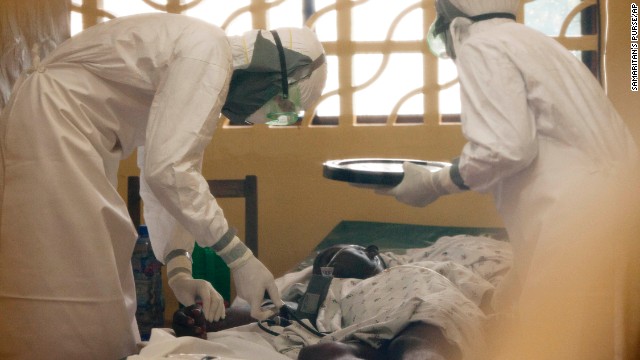
A 10-year-old boy whose mother was killed by the Ebola virus walks with a doctor from the aid organization Samaritan's Purse after being taken out of quarantine Thursday, July 24, in Monrovia.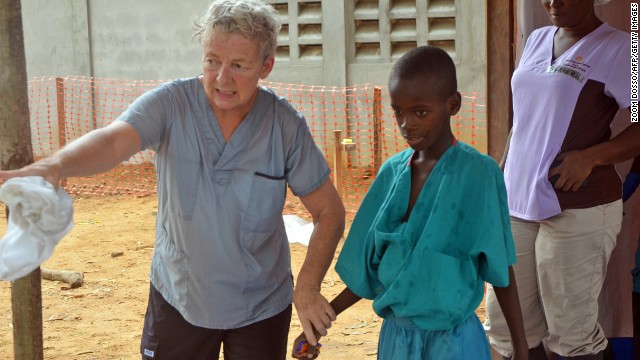
A doctor puts on protective gear at the treatment center in Kailahun, Sierra Leone, on Sunday, July 20.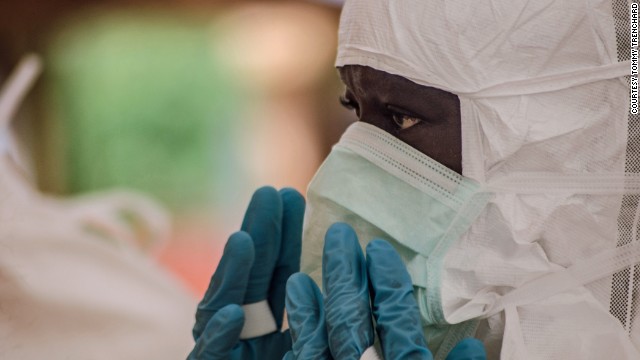
Members of Doctors Without Borders adjust tents in the isolation area in Kailahun on July 20.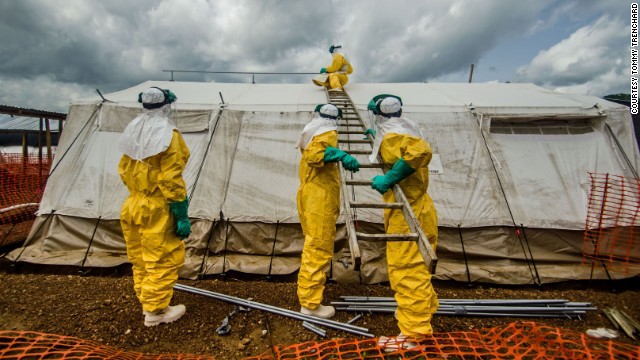
Boots dry in the Ebola treatment center in Kailahun on July 20.
Red Cross volunteers prepare to enter a house where an Ebola victim died in Pendembu, Sierra Leone, on Friday, July 18.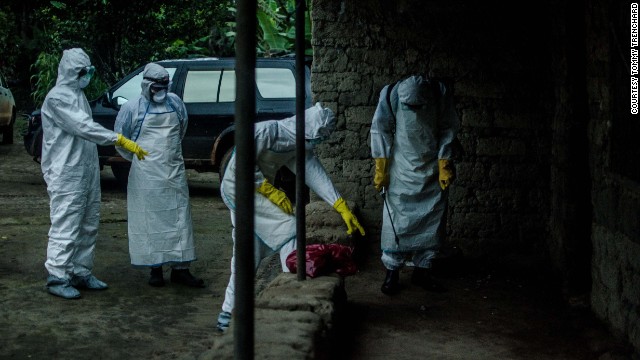
Dr. Jose Rovira of the World Health Organization takes a swab from a suspected Ebola victim in Pendembu on July 18.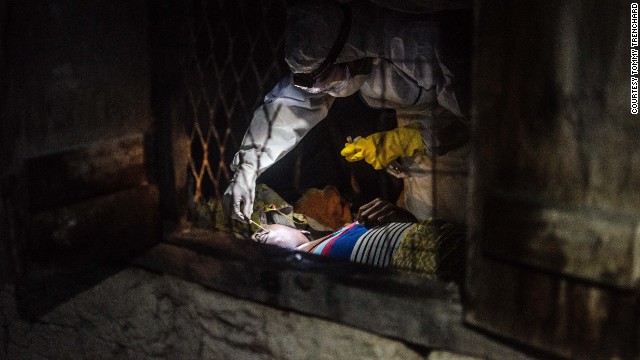
Red Cross volunteers disinfect each other with chlorine after removing the body of an Ebola victim from a house in Pendembu on July 18.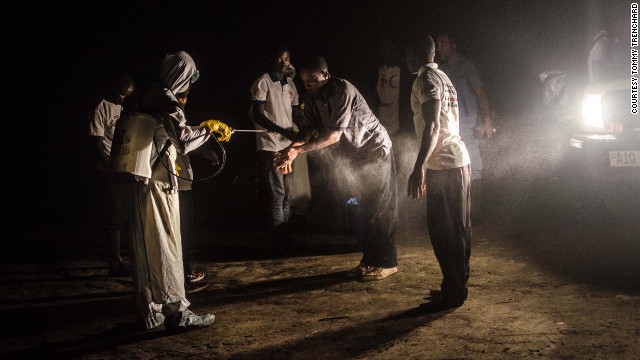
A dressing assistant prepares a Doctors Without Borders member before entering an isolation ward Thursday, July 17, in Kailahun.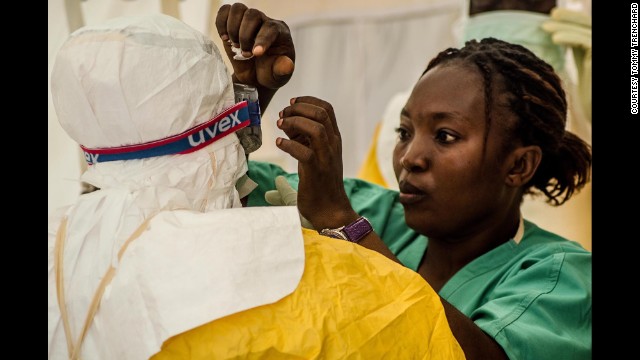
A doctor works in the field laboratory at the Ebola treatment center in Kailahun on July 17.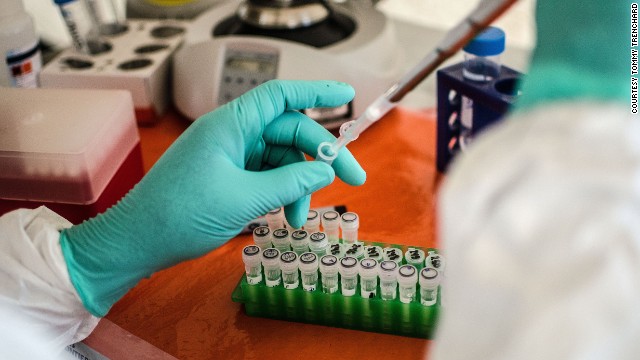
Doctors Without Borders staff prepare to enter the isolation ward at an Ebola treatment center in Kailahun on July 17.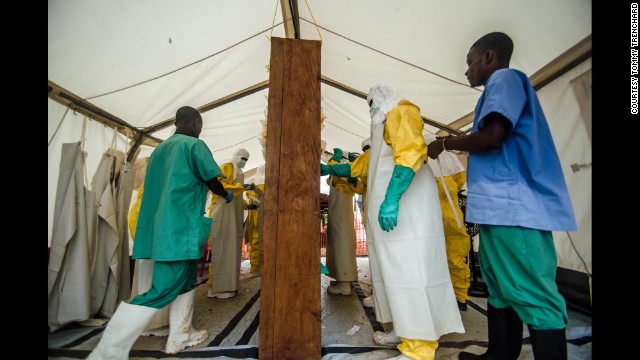
A health worker with disinfectant spray walks down a street outside the government hospital in Kenema, Sierra Leone, on Thursday, July 10.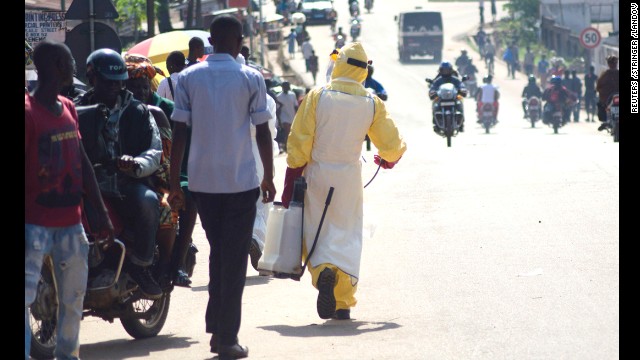
Dr. Mohamed Vandi of the Kenema Government Hospital trains community volunteers who will aim to educate people about Ebola in Sierra Leone.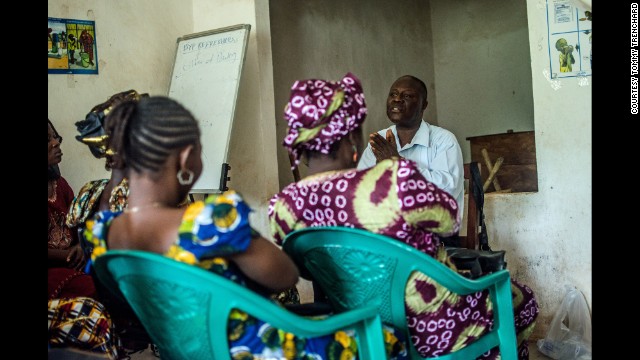
Police block a road outside Kenema to stop motorists for a body temperature check on Wednesday, July 9.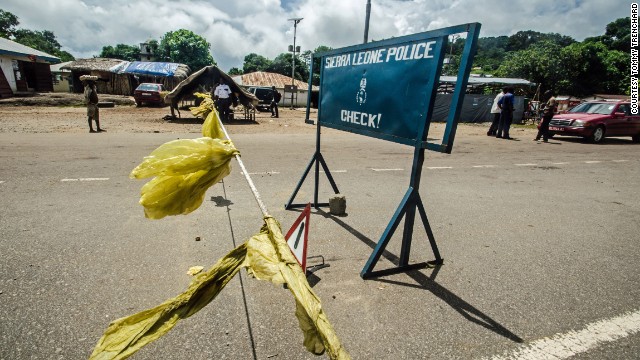
A woman has her temperature taken at a screening checkpoint on the road out of Kenema on July 9.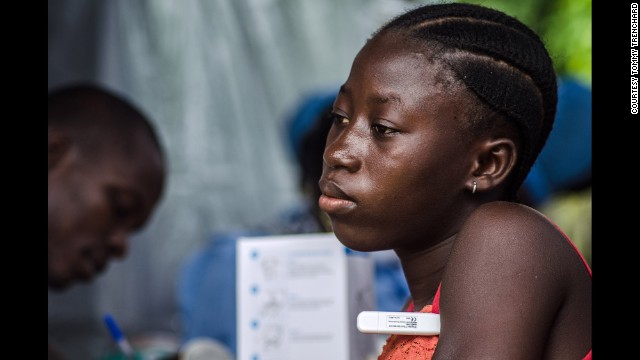
A member of Doctors Without Borders puts on protective gear at the isolation ward of the Donka Hospital in Conakry, Guinea, on Saturday, June 28.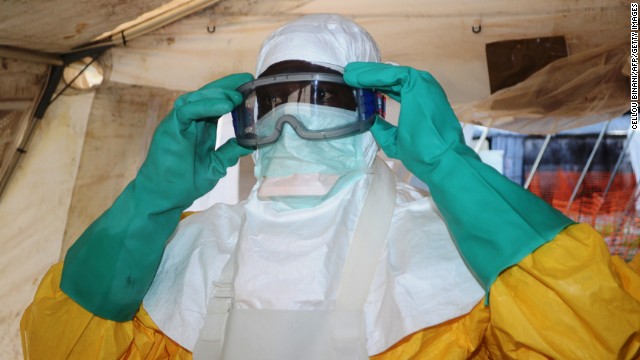
Airport employees check passengers in Conakry before they leave the country on Thursday, April 10.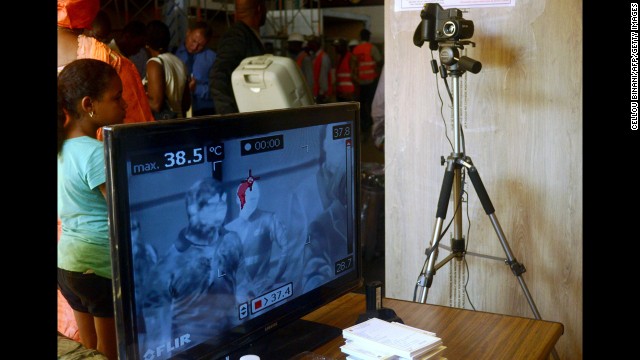
CNN's Dr. Sanjay Gupta, left, works in the World Health Organization's mobile lab in Conakry. Gupta traveled to Guinea in April to report on the deadly virus.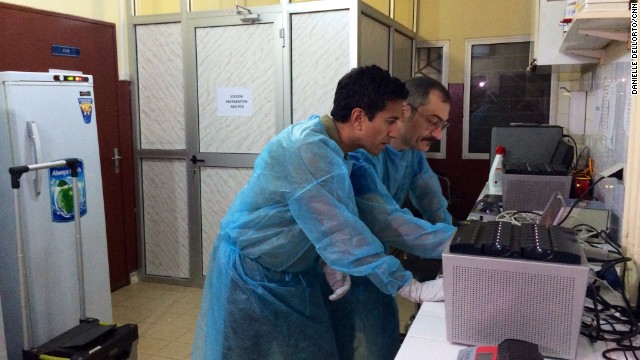
A Guinea-Bissau customs official watches arrivals from Conakry on Tuesday, April 8.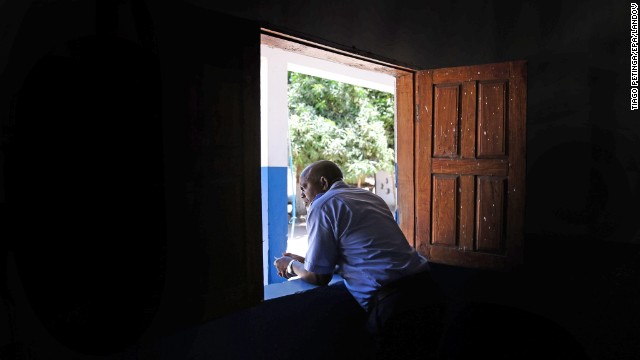
Egidia Almeida, a nurse in Guinea-Bissau, scans a Guinean citizen coming from Conakry on April 8.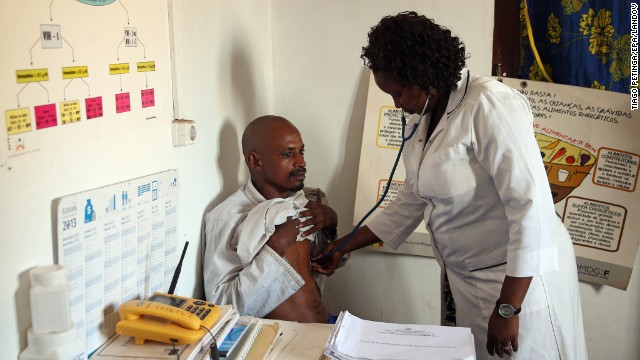
A scientist separates blood cells from plasma cells to isolate any Ebola RNA and test for the virus Thursday, April 3, at the European Mobile Laboratory in Gueckedou, Guinea.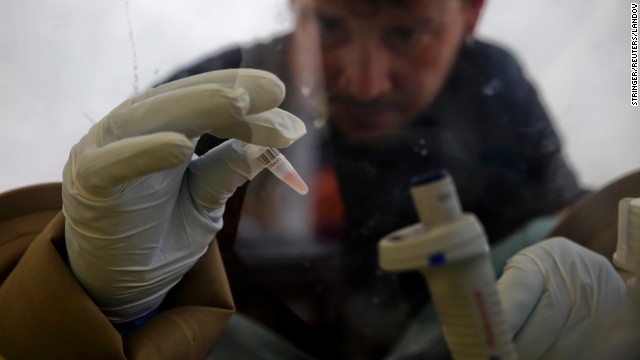
Members of Doctors Without Borders carry a dead body in Gueckedou on Friday, April 1.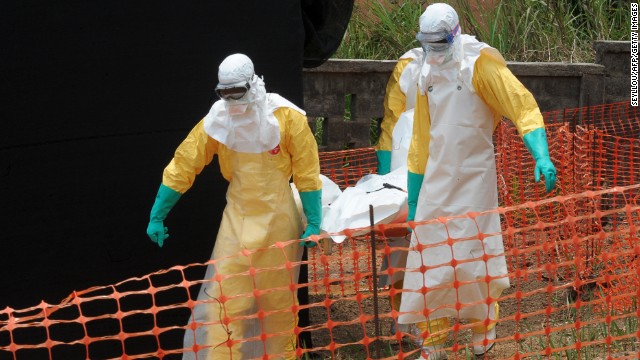
Gloves and boots used by medical personnel dry in the sun April 1 outside a center for Ebola victims in Gueckedou.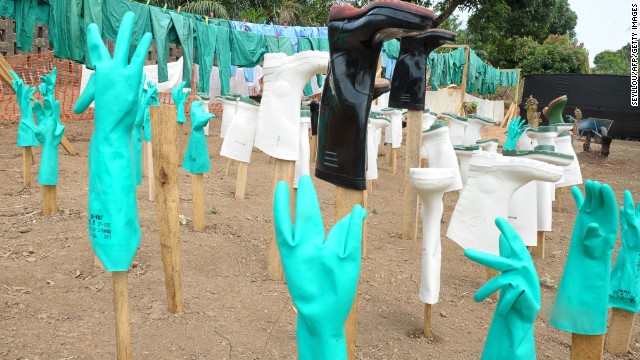
A health specialist works Monday, March 31, in a tent laboratory set up at a Doctors Without Borders facility in southern Guinea.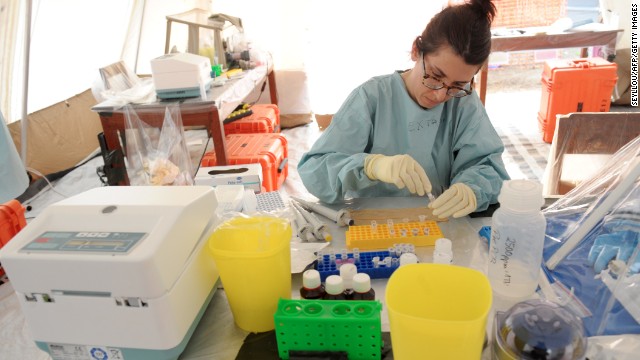
Health specialists work March 31 at an isolation ward for patients at the facility in southern Guinea.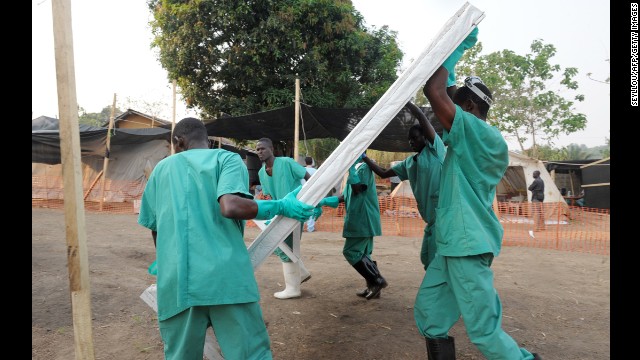
Workers associated with Doctors Without Borders prepare isolation and treatment areas Friday, March 28, in Guinea.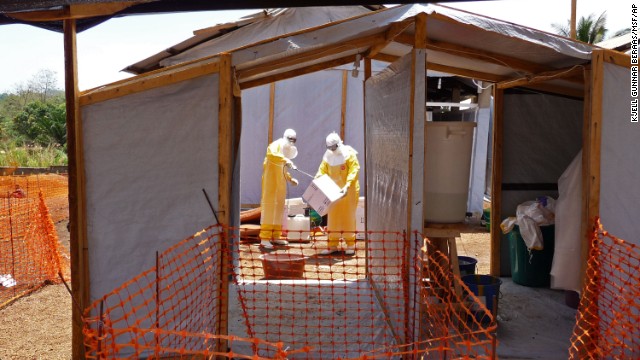

1

2

3

4

5

6

7

8

9

10

11

12

13

14

15

16

17

18

19

20

21

22

23

24

25

26

27

28

29

30

31

32

33

34

35

36
- Samaritan's Purse leader: Initial response to Ebola outbreak was a "failure"
- Affected African countries don't have ability to contain the virus alone, he says
- CDC director says number of Ebola cases likely undercounted
(CNN) -- Missionaries from Samaritan's Purse had hoped they wouldn't have to become involved in the clinical care of Ebola patients in West Africa. But by June, they realized they had no choice, says Ken Isaacs, vice president of international programs and government relations for Samaritan's Purse.
The deadly Ebola virus had spread from Guinea to Liberia and Sierra Leone. At the time, nearly 400 cases and more than 200 deaths had been reported.
Now there are more than 1,711 suspected and confirmed Ebola cases in the region, including 932 deaths, according to the World Health Organization, and the epidemic has spread to Nigeria.

Why Ebola drug isn't available in Africa
Samaritan's Purse believes these numbers represent fewer than half of the real number of cases, Isaacs said Thursday at an emergency congressional hearing on the Ebola outbreak.

FDA changes Ebola drug status hold

CDC director: 'We can stop Ebola'

How an Ebola outbreak can start, and end

Ebola treatment raises ethical questions

Step inside the CDC's Ebola war room
"The Ebola crisis we are now facing is not a surprise to us at Samaritan's Purse, but it took two Americans getting the disease in order for the international community and the United States to take serious notice of the largest outbreak of the disease in history," Isaacs said.
He characterized the initial international response to the Ebola outbreak as a "failure" because the virus spread outside the country where the outbreak originated. He said that a broader coordinated intervention is the only thing that will slow the size and speed of this disease.
"The ministries of health in Guinea, Liberia and Sierra Leone do not have the capacity to handle these crises in their countries," Isaacs said. If the international community does not get involved, "the world will be relegating the containment of this disease that threatens Africa and other countries to three of the poorest nations in the world."
Centers for Disease Control and Prevention Director Dr. Tom Frieden agrees that the number of people who have been infected with Ebola is likely undercounted. That's in large part, he said at the hearing, because there are a limited number of lab facilities there to confirm the cases accurately.
Ebola virus: Nine things to know about the killer disease
That's why developing a better lab system is so important, he said. The CDC is working with international partners, the U.S. Defense Department and the National Institutes of Health to bulk up the lab infrastructure in West Africa and to develop a better way to transport blood samples to those labs.
What's most important, Frieden said, is that people understand that there is a clear way to stop this outbreak -- and that's at the source in Africa. This, he said, is the only way to get it under control.
"It's laborious. It's hard. It requires local knowledge and local action."
The roots of our Ebola fears
Stopping the epidemic will be particularly challenging since the local health system is so weak, he said. While the CDC will send at least 50 staff in the next week or two, the health system has to be beefed up to stop and prevent future outbreaks.
Frieden said that someone once told him the CDC is the world's 911 system. While he appreciated the compliment, he wants to make sure that every country or region has its own 911.
Ebola is here: 5 reasons not to panic
Dr. Ariel Pablos-Méndez, the assistant administrator for the U.S. Agency for International Development's Bureau for Global Health, said that USAID is providing funding to help with the response to this outbreak.
They are coordinating a response with local health workers and have provided 35,000 sets of protective equipment, supplies, soap and water. Many health care workers are still laboring in the region without protective gear, which is why these workers make up a large portion of Ebola cases.
There was a sense of optimism at the hearing.
"We are confident we can contain and stop the virus," said Bisa Williams, the State Department's deputy assistant secretary for the Bureau of African Affairs.
The State Department is working closely with the governments of all the countries impacted by the outbreak. They are trying to help health care providers gain access to affected areas. They are also giving technical and financial assistance to treatment centers.
Williams said an international response will be essential.
What is the risk of catching Ebola on a plane?
9 questions about this new Ebola drug
Experimental drug likely saved Ebola patients

